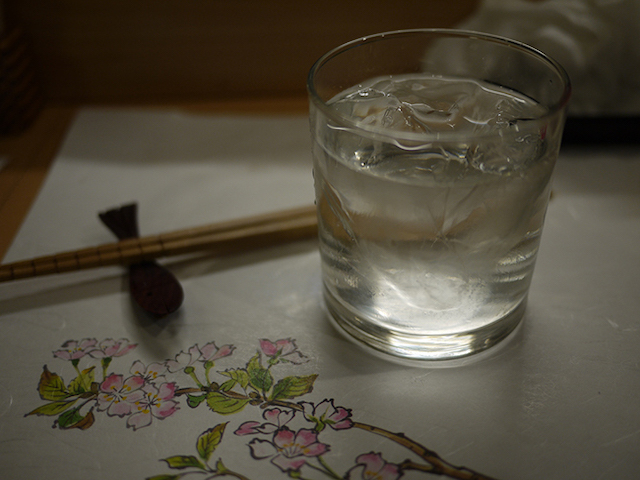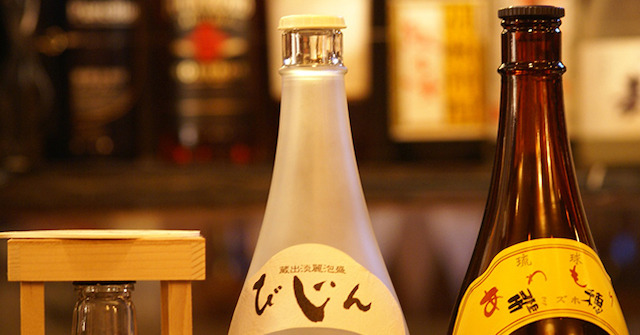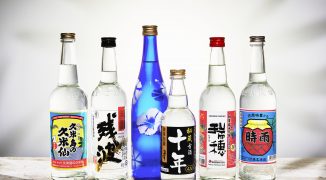Shochu is Japan’s most popular alcohol, eclipsing even sake. Until recently, shochu has been virtually unknown in the U.S., but it’s been making an impression in NYC bars like Angel’s Share, the acclaimed (but hard-to-find) speakeasy tucked away in the East Village that serves up meticulously made cocktails, Japanese-style.
For the record, Japanese shochu is not to be confused with soju, the low-proof Korean alcohol. (We’ll get to what shochu actually is, below.) Modern Korean soju is continuously distilled from a variety of grains like sweet potatoes, rice and tapioca. (Traditional production methods — 100% rice and single, pot distillation — largely ended after WWII, although a renewed interest in artisanal, premium soju seems to be on the horizon.) Today’s sojus are clear and taste slightly sweeter than vodka, although some brands have harsher solvent notes than others. Soju’s neutrality gives it mainstream appeal and makes it a handy base for cocktails at restaurants without full liquor licenses. In Korean clubs and restaurants, it’s not uncommon to shoot soju while drinking beer.
If it’s not soju, then what is shochu? While sake is a familiar accompaniment to sushi in the U.S., shochu is actually the more popular alcohol in Japan. Imbibed around the country in izakayas — analogous to gastropubs in the U.S. — shochu has been produced for the past 500 years, but has experienced a huge resurgence among drinkers in their 20s and 30s in the last decade.
“If you go out in Japan,” says Jesse Fallowitz, co-founder of Mizu Shochu, “young people aren’t usually drinking sake — they’re drinking shochu. It’s everywhere.”
The difference between sake and shochu? Sake is brewed from rice, while shochu can contain additional ingredients and is distilled. For Fallowitz, there’s a huge difference between mass-produced, double-distilled shochu and honkaku, or authentic style shochu, which to this day is produced in small batches by mom-and-pop distilleries. In true farm-to-bottle fashion, the ingredients used depend on what grows well in the distillery’s particular area, and can include rice, barley, sweet potato, sugarcane, and even sesame seeds, dates, shiso, or ginger. Honkaku shochu is distilled once in stainless steel pot stills, which preserves the natural oils and essences of the raw materials. From there, the aging processes are myriad. The use of spring water is a particular point of pride for the hundreds of small distilleries that dot Kyushu, a mountainous island about half the size of Scotland and where most honkaku shochu is produced.
Shochu has clean, aromatic characteristics that may be faintly reminiscent of sake, due to the fact that both shochu and sake typically begin with the use of koji, a microbe that converts the starches of rice into sugars. (For those familiar with beer and whiskey production, malts with their enzymes also serve this function.) The strain of koji used, coupled with a mash bill of locally sourced ingredients and water, is responsible for the unique terroir of the more than 5,000 kinds of shochu produced on Kyushu.
 Shochu is usually served neat or served with fresh squeezed juice, but it also makes for a stellar alternative spirit in classic cocktails like martinis and Negronis. Photo via Flickr/Ryan McBride.
Shochu is usually served neat or served with fresh squeezed juice, but it also makes for a stellar alternative spirit in classic cocktails like martinis and Negronis. Photo via Flickr/Ryan McBride.
For example, Mizu hand-selects barley and rice from local village farms and cultivates an uncommon black koji that adds a “richness and complexity” to its final product. Tasting notes include soft and sweet aromas of “banana and cantaloupe, mingling with greener notes of grass and fresh sourdough,” smooth, buttery texture, and flavors of “banana, vanilla and custard” with “grassy undertones and a long finish with hints of toasted coconut.”
“You can definitely taste the differences between the styles that originate from various prefectures,” Fallowitz explains. “Japanese cooking is all about the ingredients. There’s an obsession with where they come from, how fresh they are, and the processes used. It’s almost like what’s parodied on “Portlandia,” and that attention to origin and quality happens with shochu as well. It’s what makes shochu really distinctive from many other spirits.”
In Japan, shochu is popularly sipped neat or mixed with fresh squeezed juice. Many brands are often proofed down to 50 proof, but Mizu has chosen to bottle its distillate at 70 proof, which according to Fallowitz, preserves the depth and body of the spirit and lends it more favorably for mixing into cocktails. Generally, shochu pairs well with Asian-inspired ingredients like yuzu and matcha, but it can also serve as an alternative spirit for a twist on classic cocktails like martinis and Negronis.
In NYC, revered barmen like Shingo Gokan of Angel’s Share are mixing unique shochu concoctions that are equally delicious as they are aesthetically pleasing. Gokan’s Flirtibird cocktail incorporates Mizu shochu with yuzu juice, shiso, and agave, presented artfully in a Japanese tea ceremony bowl with a plum salt rim. Kenta Goto of the eponymous Bar Goto crafts shochu cocktails of minimalist perfection, like his “Improved Shochu Cocktail” of shochu, aged gin, and hop liqueur, served in wooden square bowls that are redolent with cedar. Nico De Soto of Mace plays on shochu’s harmony with green notes by infusing the spirit with white tea, and then combining it with grass cordial and grapefruit oil (picture a slender Japanese teacup with a single ice ball and grapefruit peel).
If shochu’s production is an art, then the aforementioned cocktails take the Japanese concept of kodawari — or striving for perfection without compromise — to the next possible level. But shochu, given its rustic roots, can also be enjoyed simply — sipped neat, on the rocks (preferably with one large ice cube), and even hot.





